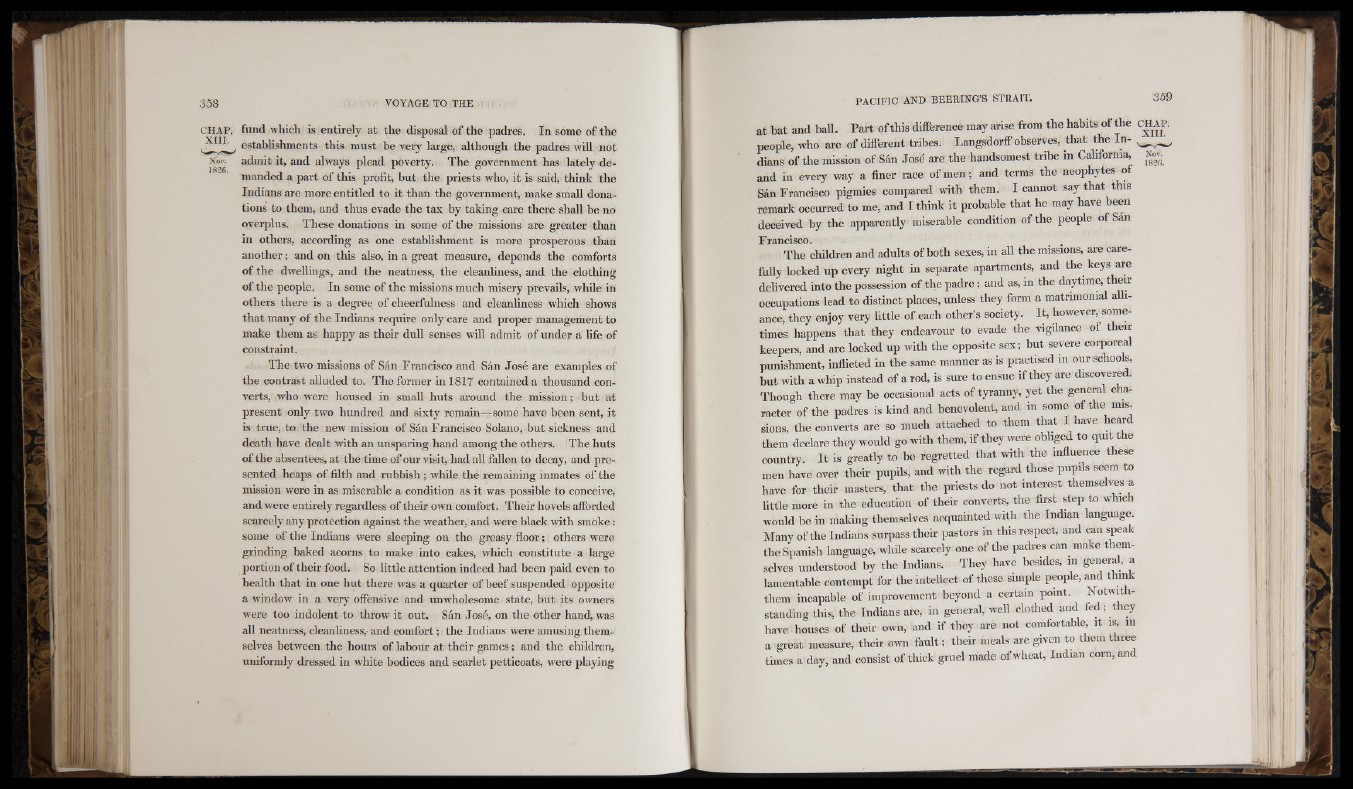
fund which is entirely at the disposal of the padres. In some of the
estabhshments this must be very lai-ge, although the padres will not
admit it, and always plead poverty. The government has lately demanded
a part of this profit, but the priests who, it is said, think the
Indians are more entitled to it than the government, make small dona-
tions to them, and thus evade the tax by taking care there shall be no
overplus. These donations in some of the missions are greater than
in others, according as one establishment is more prosperous than
another ; and on this also, in a great measure, depends the comforts
of the dwelUngs, and the neatness, the cleanliness, and the clothing
of the people. In some of the missions much misery prevails, while in
others there is a degree of cheerfulness and cleanliness which shows
that many of the Indians require only care and proper management to
make them as happy as their dull senses will admit of under a life of
constraint.
The two missions of Sán Francisco and Sán José are examples of
the contrast aUuded to. The former in 1817 contained a thousand converts,
who were housed in small huts around the mission ; but at
present only two hundred and sixty remain—some have been sent, it
is true, to the new mission of Sán F rancisco Solano, but sickness and
death have dealt with an unsparing hand among the others. The huts
of the absentees, at the time of our visit, had all fallen to decay, and presented
heaps of filth and rubbish ; while the remaining inmates of the
mission were in as miserable a condition as it was possible to conceive,
and were entirely regardless of their own comfort. Their hovels afforded
scarcely any protection against the weather, and were black with smoke :
some of the Indians were sleeping on the greasy floor ; others were
grinding baked acorns to make into cakes, which constitute a large
portion of their food. So little attention indeed had been paid even to
health that in one hut there was a quarter of beef suspended opposite
a window in a very offensive and unwholesome state, but its owners
were too indolent to throw it out. Sán José, on the other hand, was
all neatness, cleanliness, and comfort ; the Indians were amusing themselves
between the hours of labour at their games ; and the children,
uniformly dressed in white bodices and scarlet petticoats, were playing
at bat and ball. Part of this difference may arise from the habits of the CHAF.
people, who are of different tribes. Langsdorff observes, that the In- .— ^
dians of the mission of Sán José are the handsomest tribe in Cahforma, Now
and in every way a finer race of men; and terms the neophytes of
Sán Francisco pigmies compared with them. I cannot say that this
remark occurred to me, and I think it probable that he may have been
deceived by the apparently miserable condition of the people of San
Francisco. , .
The children and adults of both sexes, in all the missions, are carefully
locked up every night in separate apartments, and the keys are
delivered into the possession of the padre ; and as, in the daytime, them
occupations lead to distinct places, unless they form a matrimonial aUi-
ance, they enjoy very little of each other’s society. It, however, sometimes
happens that they endeavour to evade the vigilance of their
keepers, and are locked up with the opposite sex; but severe corporeal
punishment, inflicted in the same manner as is practised in our schools,
but with a whip instead of a rod, is sure to ensue if they are discovered.
Though there may be occasional acts of tyranny, yet the general character
of the padres is kind and benevolent, and in some of the missions,
the converts are so much attached to them that I have heard
them declare they would go with them, if they were obhged to quit the
country It is greatly to be regretted that with the influence these
men have over their pupils, and with the regard those pupils seem to
have for their masters, that the priests do not interest themselves a
little more in the education of their converts, the first step to which
would be in making themselves acquainted with the Indian language.
Many of the Indians surpass their pastors in this respect, and can speak
the Spanish language, while scarcely one of the padres can make themselves
understood by the Indians. They have besides, in general, a
lamentable contempt for the intellect of these simple people, and think
them incapable of improvement beyond a certain point. Notwithstanding
this, the Indians are, in general, well clothed and fed; they
have houses of their own, and if they are not comfortable, it is, in
a great measure, their own fault ; their meals are given to them three
times a day, and consist of thick gruel made of wheat, Indian corn, and
%
A m l